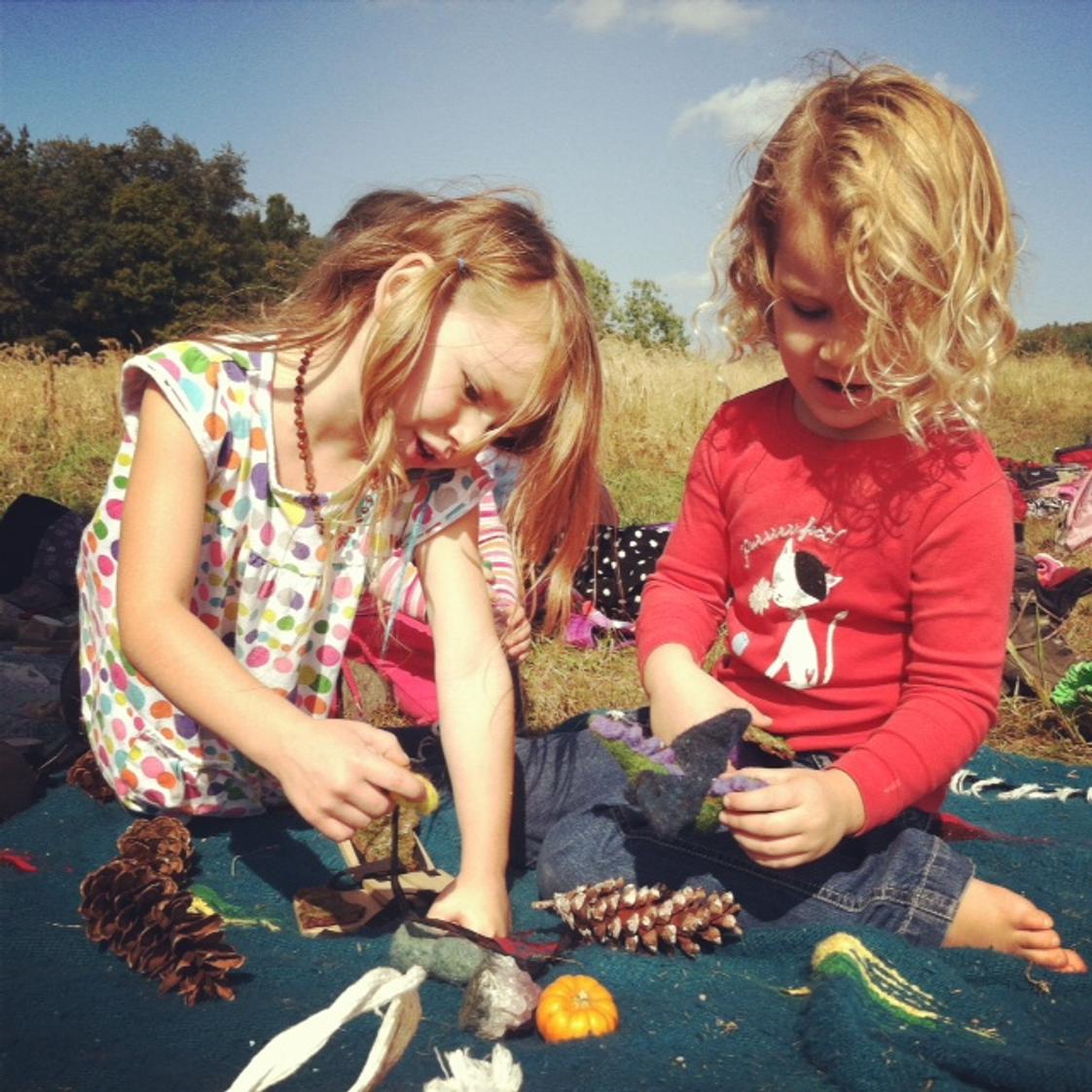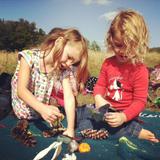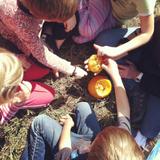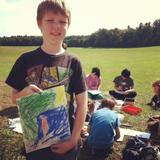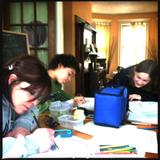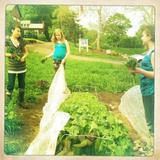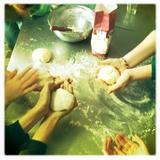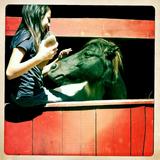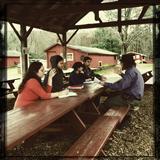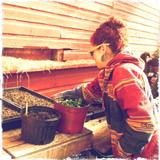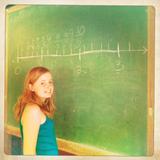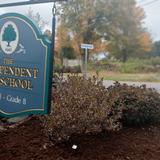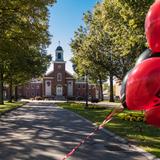The Sustainable Farm School is an independent day school for children ages 3 to 18 that offers core academics, holistic personal development, and a model for sustainable living.
Here at the Sustainable Farm School we cultivate the skills necessary for personal success through a balance of instruction, exploration, and discovery. Our students develop meaningful relationships with one another, their teachers, farm staff, and the natural environment around them.
They engage in challenging work that builds academic skills, a sense of stewardship for the environment, and an appreciation for multiculturalism.
Each student pursues the personal task of taking on responsibility for their own contribution to the greater good.
Our organic gardens and farm inspire a lifelong love of learning and are the focal point for our Waldorf-inspired pedagogy.
We cultivate the skills and virtues needed for personal success through a balance between instruction, exploration, and discovery.
Our school takes a unique approach in that we focus on teaching children to learn independently, to be self-sufficient, and to collaborate with people of all ages and levels of ability.
We believe this will prepare students for their effective futures as community members.
Join us at the Sustainable Farm School where curiosity, imagination, and initiative are organically cultivated.
Quick Facts (2026)
- School Type: Alternative School
- Grades: Prekindergarten-12
- Enrollment: 20 students
- Acceptance rate: 95%
- Average class size: 7 students
- Application Deadline: None / Rolling
- Source: Verified school update
School Overview
School Type
Religious Affiliation
Grades Offered
Grades Prekindergarten-12
Learning Difference Programs
Yes
Year Founded
2011
Summer School Offered
Yes
Student Body
Total Students
20 students
Student Body Type
Co-ed
Academics and Faculty
Total Classroom Teachers
20 teachers
Student-Teacher Ratio
1:1
National avg.:
% Faculty w/Advanced Degree
75%
Average Class Size
7 students
Classroom Dress Code
Casual
Tuition and Acceptance Rate
School Notes
- Educational Philosophy
- Waldorf schools are based on the ideas of the Austrian philosopher, artist, and educator Dr. Rudolf Steiner (1861-1925). Through his work in the fields of philosophy, science, religion, agriculture, art, medicine, and education he created a new form of pedagogy that focuses on the whole child: hands, heart, and mind.
- In 1919 Rudolf Steiner founded the first Waldorf School for the children belonging to the workers of the Waldorf-Astoria cigarette factory because he believed that quality education should be afforded to all children. The school quickly gained international recognition and hundreds of Waldorf schools sprung up all over the globe. The number of Waldorf schools worldwide has more than doubled in the last decade, making it one of the fastest growing educational movements in the world. Waldorf schools are committed to academic excellence and offer a challenging classical education that prepares students for the most demanding universities. At the core of the Waldorf philosophy is the belief that knowledge is best acquired experientially as well as academically. Education is an artistic process.
- Inspired by the Waldorf philosophy, the Sustainable Farm School takes a step beyond with two key examples. Like Waldorf, we believe individuals prosper in a simple, beautiful, and natural environment. Therefore, we hold our school on an organic farm and include all aspects of tending to the land and animals into our curricula. Our students participate in daily farm and garden chores. Learning to successfully interact with the land and animals prepares them with advanced survival skills and a love for nature. Additionally, we place specific emphasis on forward thinking ideologies including social, cultural, environmental, and economic sustainability. Our educators value the academic tradition, many of them holding the highest degrees in their field, while maintaining a natural connection to the earth. With a student to teacher ratio of 5:1, students will get the attention and guidance necessary for a comprehensive and enjoyable education.
- Our main lesson is a 1.5 to 2 hour long daily lesson rotating through the five academic subjects: Language Arts, History, Mathematics, Science, and Literature. Our secondary courses include Whole Food Preparation, Radical Home Economics, the Mythologies, Music, Art, and Philosophy among others. Each term focuses on a different cultural or historic theme, unifying lessons and creating a diversity of understanding in the schoolroom.Our school takes a step beyond the Waldorf School and traditional educational experience.
Source: Verified school update
Frequently Asked Questions
What is the acceptance rate of Sustainable Farm School?
The acceptance rate of Sustainable Farm School is 95%, which is higher than the national average of 71%.
When is the application deadline for Sustainable Farm School?
The application deadline for Sustainable Farm School is rolling (applications are reviewed as they are received year-round).
School Reviews
5 5/17/2016
My daughter has been at SFS since the first year the school started. Through this remarkable model of education she has found friendship and the confidence to synthesize information and form her own opinions. While in the public school she memorized a lot of information she didn't understand and could repeat it back. She never wanted to stand up and state her own ideas. Now she is able to form her own opinions based on a combination of facts and deep understanding and knowledge. The school combines the skills and knowledge of traditional schooling with the tools and awareness necessary to exist in the modern world and to be a self aware human. She loves school and tries to start a protest whenever they are on break.
5 7/24/2015
Participating in SFS changed my sons life forever. He is confident and proud for the first time. He told me he never knew he was smart before SFS. That is what the program and teachers there have taught him. He soared miles beyond his friends in public school in so many ways. His words "I learned to be a part of life itself, I feel good about myself in ways I never knew before." It is the gift I gave my child.
Endorse Sustainable Farm School. Endorsements should be a few sentences in length. Please include any comments on:
- Quality of academic programs, teachers, and facilities
- Availability of music, art, sports and other extracurricular activities
- Academic or athletic awards
Recent Articles

Guides to ˛ÝÁńÉçÇř Schools in 2026
Updated 2026 guide to private schools, covering admissions trends, tuition, financial aid, school types, and expert tips for families.

Why ˛ÝÁńÉçÇř School in 2026: Advantages, Trends, and What Families Need to Know
Explore why private school remains a compelling choice in 2026, with updated trends, outcomes, and real‑world benefits for families today.

Costs of ˛ÝÁńÉçÇř School in 2026
Discover the hidden costs of private school in 2026, including fees, uniforms, and extras parents must budget for beyond tuition.


